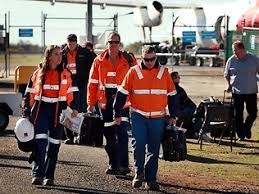
Fly In Fly Out Workers Salary Sacrificing Their Airfares
Make sure your employer pays for your airfares direct, not reimburses you or the salary sacrifice is at best a waste of time, or at worse going to cost you more than if you just paid the airfares out of your after tax take home pay.
If you work in a remote area on a fly in fly out basis then the air fares to get you from your normal place of residence to your remote work location are an exempt fringe benefit if paid direct by your employer to the airline. An exempt fringe benefit is a benefit that a worker receives without having to pay tax on it and the employer does not have to pay fringe benefits tax either. Fringe benefits tax is designed to make the employer pay the tax that the ATO missed out on by the worker not receiving the equivalent amount as wages. Generally, an employer will reduce the worker’s package by the amount of fringe benefits tax they have to pay.
The problem is some employers are making a capital city airport such as Perth the “point of hire” and only paying the airfares from that point. The worker has to pay and organise their travel from home to the capital city airport.
If a worker pays the airfare to get themselves to the “point of hire” it is not tax deductible any more than an office worker’s train fare is. It is at a point before the income earning activities begin. The FIFO air fare concession only applies if the employer pays the airfare.
Some employers have tried to get around this by offering to allow their workers to salary sacrifice these air fares. The trouble is some employers (even the big mining companies) ask the worker to organise and pay the airfares, then the employer reimburses the worker. If the airfares are reimbursed they do not qualify for the exemption for remote FIFO workers. The employer has to pay the airfares direct. They can still organise to reduce the worker’s salary package as a result but the employer must pay the airline.
In the worse case scenario, the worker is worse off than if they simply ignored the offer of reimbursement because the employer is still going to deduct the airfares from their salary package anyway as well as the FBT. This might be best explained by a worked example assuming the airfares cost $1,000 and the worker is in the 39% tax bracket, that is earning between $90,000 and $180,000 a year in gross wages.
Worker just pays for their own airfare:
First earn gross wages of $1,639.34 and pay tax at 39% = $639.34 leaving a net pay of $1,000 to pay the airfares.
Employer reimburses worker for their airfare expense:
Worker gives the employer invoices for $1,000 so the employer gives the worker $1,000 cash. This reimbursement is a fringe benefit so the employer must pay FBT on the $1,000. Assuming no employee contribution*, the FBT is calculated as follows $1,000 x 2.0802 x 47% = $977.69. The employer then reduces the workers gross pay by $1,977.69 to cover its out of pocket expenses. Though if you are very lucky your employer may adjust this for the fact they get the GST back on the airfares.
On top of all this, if it is not an exempt fringe benefit then the benefit is reportable so it will be added into your income for many thresholds such as Medicare Levy Surcharge, Centrelink family payments, the private health insurance rebate etc. If you do not make an employee contribution this add back will be slightly higher than if you just paid the airfares out of your take home pay and didn’t claim the reimbursement.
In short because the employer reimburses the airfare rather than pays the amount direct to the airline the expense does not qualify as an exempt fringe benefit. With FBT a $1,000 salary sacrificed airfare is going to reduce the worker’s package by $1,977.69 where as if they had paid the airfare themselves out of their take home pay it would have only cost them $1,639.34 in before tax dollars ie reduced their package by only $1,639.34. But the kicker is if the employer simply paid the airfares themselves and recovered the cost from the worker’s package that would only reduce the worker’s package by $1,000 before tax, maybe even less if the employer is good enough to allow for the GST they will get back on the airfares.
Just to reiterate, the bottom line is if you, the worker, pay the airfare there is nothing to gain and possibly something to lose if your employer reimburses you for that airfare in a salary sacrifice arrangement. Yet there is a huge tax benefit if the employer simply pays the airfare direct and reduces your gross wages before tax by the amount of that airfare. The employer is no worse off, other than the administration cost of paying for the airfare which is unlikely to be much different than the administration costs of processing the reimbursement.
If your employer needs clarity on this issue refer them to https://www.ato.gov.au/law/view/document?DocID=SAV%2FFBTGEMP%2F00021
*Note an employee contribution would only bring everything back to the same cash flow position as if the worker just paid the airfares him or herself out of their tax home pay. Still not the solution.
 Julia's Blog
Julia's Blog